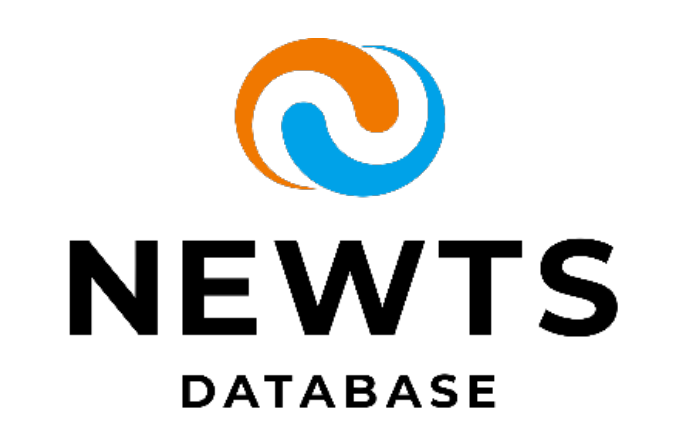In the above image, NETL’s Nicholas Siefert (far right) discusses the recently developed NEWTS database as well as the NEWTS dashboard being developed by the Lab that displays sites across the nation where energy-related wastewater stream samples and composition data have been collected. Others contributing to the development of this online tool included NETL’s Madison Wenzlick (far left) and Alexis Hammond, a Mickey Leland Energy Fellowship research associate. (PI: Burt Thomas; Dashboard Developer: Devin Justman, not shown).
Community leaders and water researchers can now access publicly available online datasets curated and processed by NETL to better understand the composition of energy-related wastewater streams. The data will help mitigate environmental risks and identify possible sources of valuable critical minerals (CMs).
 The National Energy Water Treatment and Speciation (NEWTS) Database provides information at no cost about the levels of toxins, concentrations of metals and other hazardous materials found in energy-related wastewater streams, which include power plant leachate, acid mine drainage, brackish water and oil and gas produced water. Researchers can input the data into computer software to develop appropriate remediation steps.
The National Energy Water Treatment and Speciation (NEWTS) Database provides information at no cost about the levels of toxins, concentrations of metals and other hazardous materials found in energy-related wastewater streams, which include power plant leachate, acid mine drainage, brackish water and oil and gas produced water. Researchers can input the data into computer software to develop appropriate remediation steps.
The NEWTS team is also developing a database dashboard showing sites across the nation where energy-related wastewater stream samples and composition data have been collected. Using the dashboard, community leaders and the public will be able to quickly obtain data from locations displayed on a map where various government agencies collect and analyze water samples from energy-related wastewater streams.
NETL’s Nicholas Siefert, an engineer who helped develop the NEWTS database along with principal investigators Burt Thomas and Madison Wenzlick, explained the tool can also be used to learn about the presence of CMs, including rare earth elements (REEs), in those wastewater streams.
“In addition to providing water quality data to the public, NEWTS can identify energy-related wastewater streams that are rich in CMs and REEs, which are crucial to the development of clean energy technologies such as wind and solar power and electric vehicles as well as electronics and defense systems,” Siefert said. “In this way, the NEWTS Database can help bring new industries and jobs to fossil energy power plant and mining communities to ensure they are not left behind as the nation transitions to clean energy.”
The United States remains heavily reliant on offshore suppliers for REEs and CMs. Currently, the United States imports approximately 80% of its REEs directly from China. Produced water, a byproduct of almost all oil and gas operations and hydraulic fracturing, and other energy-related wastewater streams are untapped resources for extracting CMs and REEs needed to bolster U.S. energy, economic and national security.
The NEWTS team is focused on releasing high-quality datasets of water compositions in formats that can be easily entered into software for modeling processes to treat energy-related wastewater streams. The NEWTS website is the first step in addressing a challenging data gap, and this work is part of NETL’s larger effort to obtain datasets for quantifying water quality and volume data related to energy processes across the United States.
Data in these wastewater streams are managed by state and federal regulators and are often difficult to find and analyze. Therefore, the NEWTS database will improve data access to understand what is in these water streams and will ultimately enable improved water management decisions.
The NEWTS team released the first series of data on Sept. 30, 2022, on the Energy Data eXchange (EDX), which included three large datasets with flue gas desulfurization (FGD) power plant effluent, brackish water and produced water compositions in formats that are easy to enter into commercial software such as OLI Studio and Geochemist Workbench.
Future releases will include additional large datasets of energy-related water samples with accompanying compositions. Funding for the NEWTS database and dashboard was provided by the Department of Energy/Office of Fossil Energy and Carbon Management Advanced Remediation Technologies Division.
NETL is a U.S. Department of Energy national laboratory that drives innovation and delivers technological solutions for an environmentally sustainable and prosperous energy future. By leveraging its world-class talent and research facilities, NETL is ensuring affordable, abundant and reliable energy that drives a robust economy and national security, while developing technologies to manage carbon across the full life cycle, enabling environmental sustainability for all Americans.





 The
The